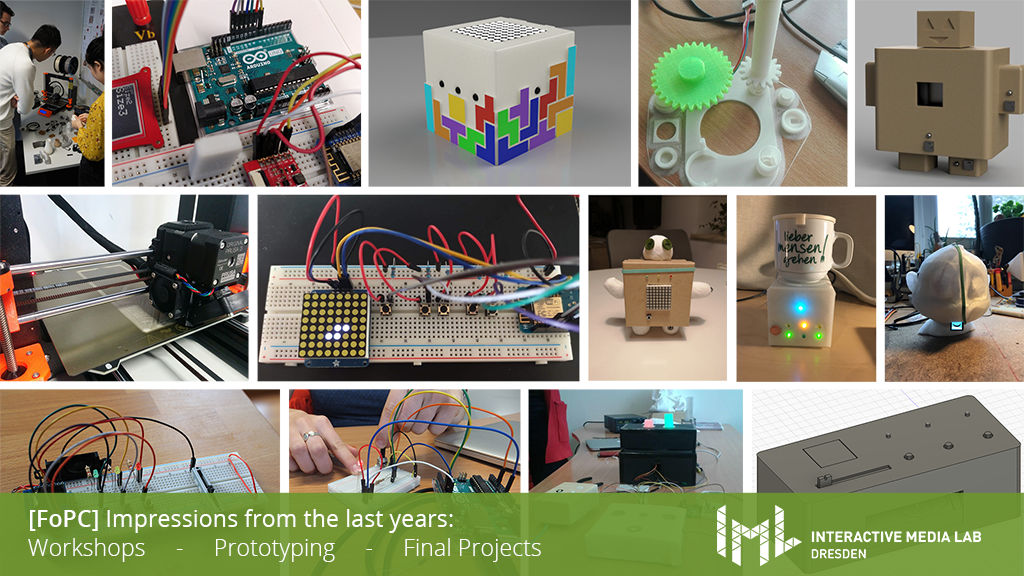Sommersemester 2022

In the practical laboratory course „Foundations of Physical Computing“, we teach theoretical basics as well as practical knowledge for the development of interactive, physical prototypes. Therefore, we first look into the electronic basics, and will test and discuss components and circuits using small examples. In addition, participants will learn how to use sensors, actuators and displays by using the Arduino microcontroller. The learned knowledge will be deepened by creating practical examples and accompanying in-depth lectures and exercises. Furthermore, CAD modelling and its physical fabrication using a 3D printer are also part of the seminar. In addition, participants will also gain insights into wearables, e-textiles and smart materials and manufacture their own textile touch and pressure sensors. In parallel, each project group will also work on a practical project in which own prototypes for human-computer interaction will be developed and presented at the end of the course.
Anything but Displays
Ambient Devices as Personal Companions
Our modern world has displays everywhere. We are constantly overloaded by screens and striking visual content all around. Wouldn’t it be nice to have information waiting in our periphery until the moment we are seeking insights? So-called calm technologies try to close this gap by passively integrating information into our everyday lives. This utopia was first described more than 25 years ago, without our todays’ smartphones, tablets, smart TVs, or modern computers. But it sounds more tempting than ever.
In this year’s “Foundations of Physical Computing” (FoPC) we want to develop new ambient devices beyond conventional screens. In contrast to smart or embedded displays, we would like to use other ways to convey information. What about a wall that changes color to inform me about the remaining time until my next exam? Or a physical token that moves over my desk till it reaches my study book? Or a gift box that opens up after the exam to reward me for my hard work?
We are curious to see your ideas coming to life in this year’s FoPC. You will develop novel ambient devices that do not use conventional displays. These should convey information in your daily life in an appealing and calm way. In just three weeks, you will work on your ideas in teams, from the concept to the design, realization, programming, and testing.
| Calendar week 33 19.08.22 |
Kick-Off Meeting Further information will follow. |
| Calendar week 34 22.08.22 till 26.08.22 |
Workshops & induction training |
| Calendar week 35 29.08.22 till 02.09.22 |
Supervised practical work |
| Calendar week 36 05.09.22 till 09.09.22 |
Individual practical work Final Presentation (09.09.22, Details will follow)) |
| Calendar week 37 12.09.22 till 16.09.22 |
Follow-up time for the project documentation Finalization of the project documentation. |
Please note that the number of participants for this course is limited to a maximum of 12 participants.
Participants will be considered according to the order of registration.
INF-B-510, INF-B-520, INF-B-530, INF-B-540, INF-MA-PR, INF-VMI-4
All information about the course is preliminary and later changes are possible.